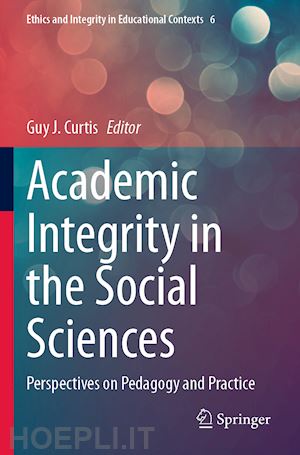
Questo prodotto usufruisce delle SPEDIZIONI GRATIS
selezionando l'opzione Corriere Veloce in fase di ordine.
Pagabile anche con Carta della cultura giovani e del merito, 18App Bonus Cultura e Carta del Docente
This international book provides a series of viewpoints on academic integrity from the perspective of social sciences. It brings together multiple aspects of academic integrity, but with the consistent theme of being at a level of analysis that considers people and their place in the world. It covers topics such as how academic integrity can be taught, and why academic integrity breaches occur.
This book informs the work of researchers, educators, and practitioners as we go forward in understanding academic integrity and addressing academic misconduct. The social sciences include academic disciplines such as sociology, economics, psychology, education, anthropology, political science, and criminology. Researchers and theorists in these fields offer a range of unique and valuable perspectives on academic integrity with questions ranging from: “Why do students cheat and how best do we teach them not to?” to “What are the societal and political implications of academic cheating?”
Series Editors’ Note.- Preface.- Acknowledgements.- Chapter 1 Do students follow the wisdom or the madness of crowds? (Guy J. Curtis).- Chapter 2. Removing the ‘opportunity’ for academic misconduct: A criminology-based framework for preventing academic integrity problems (Joseph Clare).- Chapter 3. Moral frameworks for approaching academic integrity (Frances An).- Chapter 4. Lies, lies, lies: Detecting deception and implications for investigations of academic cheating (Brenda M. Stoesz).- Chapter 5. Capitalising on emotions and emotional regulation: Five strategies to improve academic integrity (Holly E. Tatum & Guy J. Curtis).- Chapter 6. Developing and implementing policies for academic integrity: Management of change (Irene Glendinning).- Chapter 7. Evaluating the impact of implemented academic integrity policy on creative works (Stella-Maris Orim & Anirejuoritse Awala-Ale).- Chapter 8. Conducting academic integrity research with undergraduates (David A. Rettinger).- Chapter9. A pedagogy for teaching research ethics and integrity in the social sciences (Erika Löfström & Anu Tammeleht).- Chapter 10. Researching academic integrity: Application of social sciences research methods (Inga Gaižauskaite & Natalija Valaviciene).- Chapter 11. Academic Integrity as a way to promote workplace ethical behavior (Jean Gabriel Guerrero-Dib, Luis Portales, Daniela Gallego).- Chapter 12. Tactics of scholarly abuse (Brian Martin).- Chapter 13. Academic Integrity through the Lens of Informality (Elena Denisova-Schmidt).- Chapter 14. The ‘Patrick Matthew Effect’ in science (Mike Sutton & Mark Griffiths).- Afterword: The future of academic integrity and the social sciences.- Index.











Il sito utilizza cookie ed altri strumenti di tracciamento che raccolgono informazioni dal dispositivo dell’utente. Oltre ai cookie tecnici ed analitici aggregati, strettamente necessari per il funzionamento di questo sito web, previo consenso dell’utente possono essere installati cookie di profilazione e marketing e cookie dei social media. Cliccando su “Accetto tutti i cookie” saranno attivate tutte le categorie di cookie. Per accettare solo deterninate categorie di cookie, cliccare invece su “Impostazioni cookie”. Chiudendo il banner o continuando a navigare saranno installati solo cookie tecnici. Per maggiori dettagli, consultare la Cookie Policy.